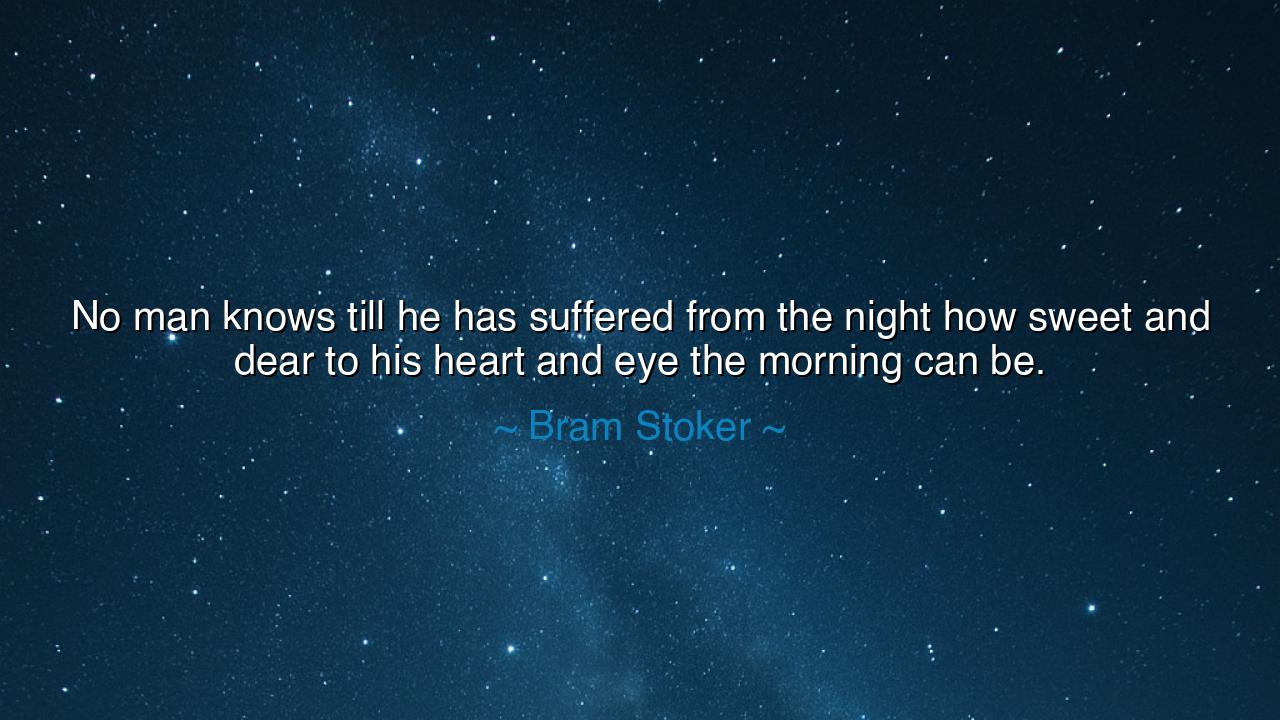
No man knows till he has suffered from the night how sweet and
No man knows till he has suffered from the night how sweet and dear to his heart and eye the morning can be.






Bram Stoker, the author who clothed shadows in words and gave to the world the immortal figure of Dracula, once wrote: “No man knows till he has suffered from the night how sweet and dear to his heart and eye the morning can be.” This utterance is not merely about the passage of hours; it is about the eternal struggle between despair and hope, between darkness and light, between the soul lost in night and the soul reborn at dawn. It is the cry of one who has felt the weight of sorrow and then tasted the blessing of deliverance.
For the night in this saying is not only the absence of the sun. It is the realm of anguish, of uncertainty, of fear. The night is the battlefield of the spirit, when all seems hidden, when the path vanishes, and the heart is beset with loneliness. To suffer the night is to endure loss, pain, or despair so deep that it blinds the inner eye. But the morning—ah, the morning!—is not only the rising of the sun but the return of hope. It is the sign that every trial, no matter how long, yields at last to renewal. The sweetness of dawn can only be known by one who has endured the darkness.
History itself bears witness to this truth. Consider the tale of Nelson Mandela, who for twenty-seven years was imprisoned in the long night of injustice. Behind the walls of Robben Island, he knew suffering, deprivation, and silence. Yet when the prison doors opened and the morning of freedom broke, he savored it with a depth that those who had never endured such a night could scarcely understand. His joy was not shallow but profound, forged in the furnace of suffering, and because he had known the night, the morning became to him sweeter than gold.
Even in ancient scripture, the same truth is echoed: “Weeping may endure for a night, but joy cometh in the morning.” This is no accident, for human experience repeats this rhythm across all generations. The night tests us, strips us, and humbles us. It teaches us the frailty of our strength and the emptiness of false hopes. But in that very breaking, it prepares us to receive the morning with gratitude, to cherish what once we took for granted. Without the darkness, light is ordinary; with the darkness, light becomes holy.
Stoker’s words also speak to the daily battles of the human soul. When sickness lays us low, health becomes radiant. When betrayal cuts deep, loyalty shines brighter. When poverty has been endured, the smallest gift is precious. Thus the suffering of the night is not wasted, but becomes the teacher of appreciation. It is the soil in which humility, gratitude, and compassion grow, and without it, the heart remains shallow, blind to the true sweetness of life.
The lesson for us is clear: do not curse the night too quickly. When hardship falls upon you, when sorrow weighs down your spirit, know that these are not the final words. They are but the shadows that make the light more vivid when it returns. Hold fast, endure, and keep faith, for the morning will come. And when it does, you will see it not with weary eyes, but with a heart made tender by suffering.
Therefore, take action in your life: when darkness descends, do not despair. Instead, train your heart to wait, to endure, and to hope. Write down your sorrows if they overwhelm you, pray if your spirit is moved, lean upon companions if you are weak. And when morning comes—whether in days, months, or years—receive it with joy, and let its sweetness remind you that every trial has its purpose. In this way, the words of Stoker shall not remain on the page, but shall live in your very flesh and blood.
For in the end, the ancient wisdom is this: only through night can we truly cherish the morning. Only through suffering can we truly know joy. And only by passing through darkness can we learn to see the light not as a given, but as a gift.






AAdministratorAdministrator
Welcome, honored guests. Please leave a comment, we will respond soon